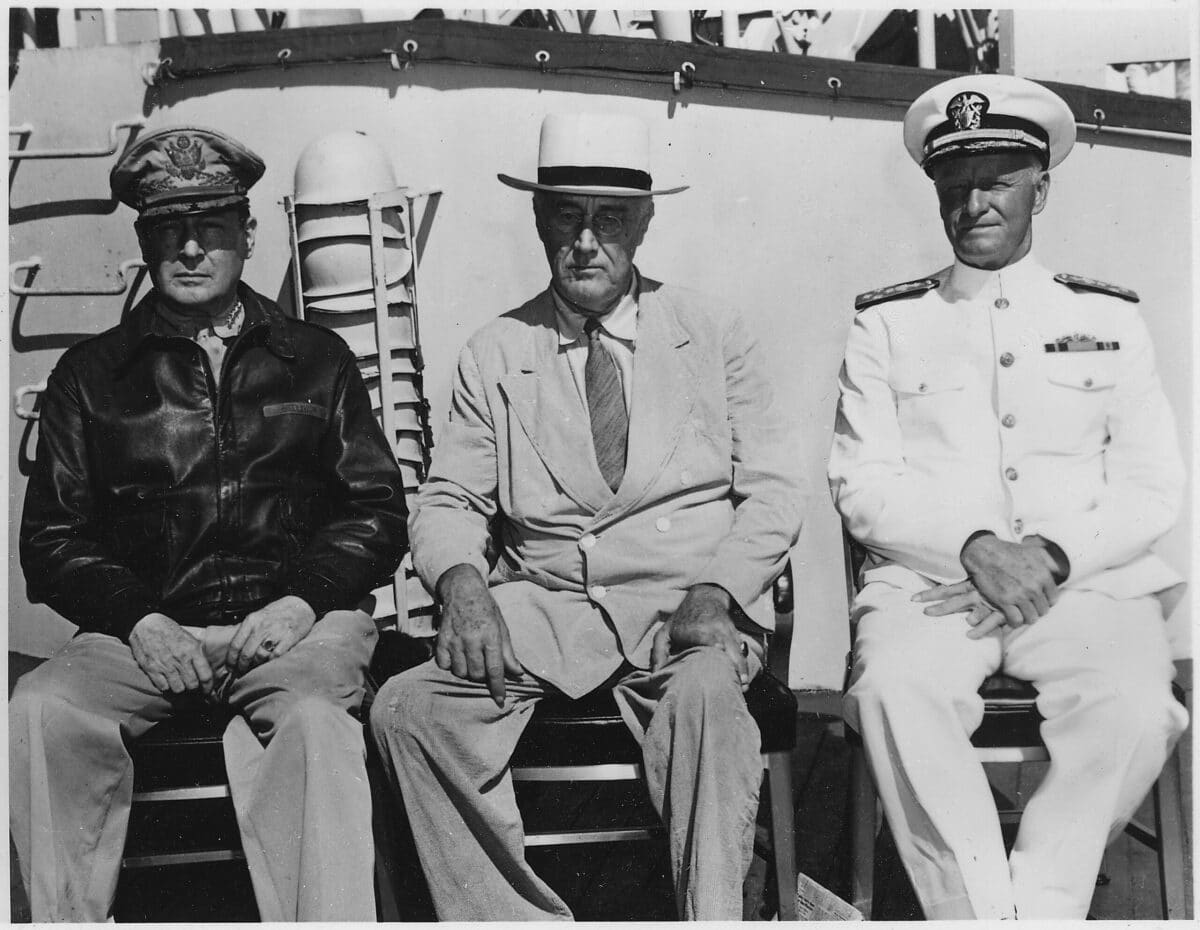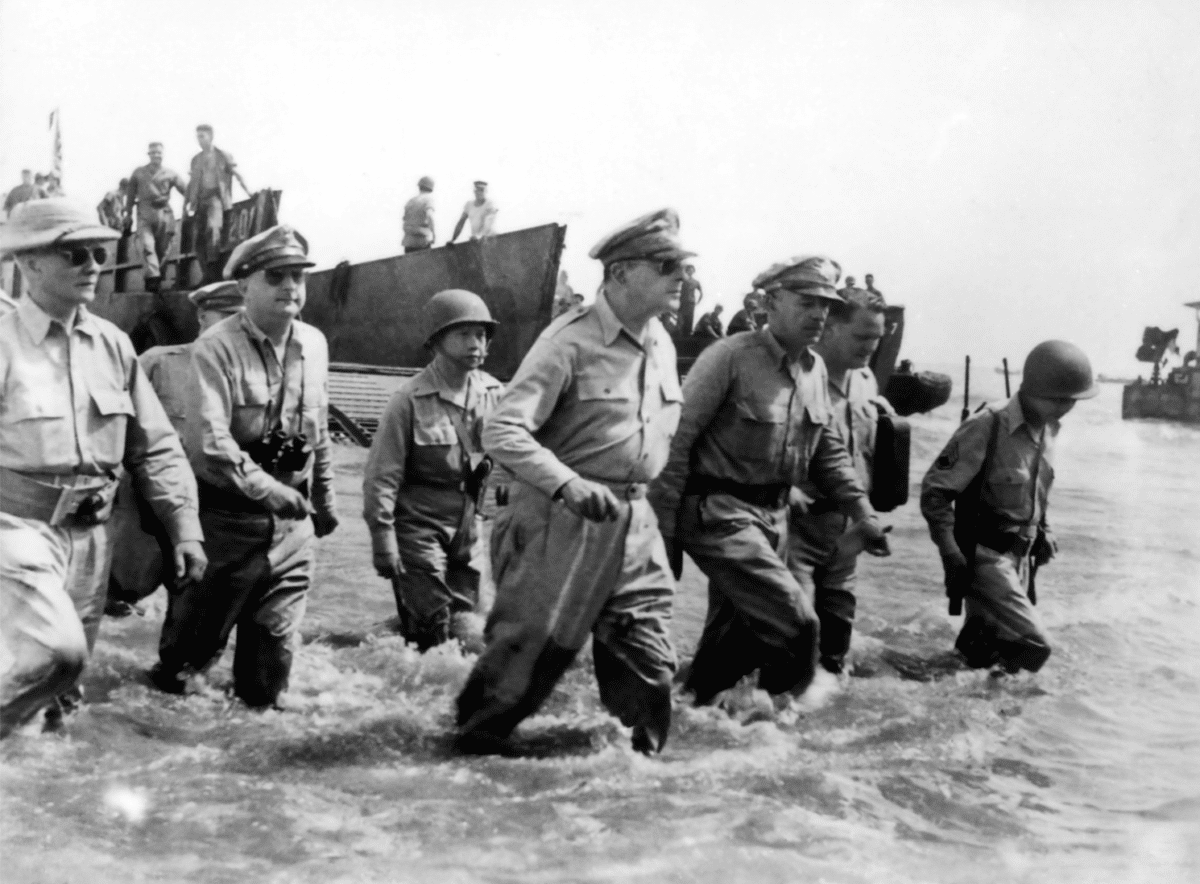falcon play October 20, 1944: General Douglas MacArthur returns to the Philippines


President Franklin Roosevelt , General Douglas MacArthur and Admiral Chester Nimitz / Photo from the National Archives
On October 20, 1944, General Douglas MacArthur along with thousands of army and naval forces attacked the Japanese held island of Leyte. Shortly after wading ashore with Filipino and American leaders, General MacArthur declared “I have returned.”
General MacArthur’s landing at Leyte on October 20, 1944, was the first time he had been in the Philippines since he was evacuated from Corregidor Island in March 1942 under orders from President Franklin Roosevelt. The evacuation was a dangerous journey for MacArthur and his family.

Gen. Douglas MacArthur wades ashore during initial landing at Leyte, Philippine Islands. Image: Wikipedia
They traveled precariously by P.T. boats to the Southern Philippine Island of Mindanao. From Mindanao, MacArthur and his family took a B-17 Flying Fortress to Australia. The final part of their journey was a lengthy train ride to Melbourne. Following his arrival at Melbourne, General MacArthur declared that “I came through and I shall return.”
Subscribe to our daily newsletter
MacArthur’s invasion of the Philippines on October 20, 1944 was not uniformly accepted by most senior officers in the US Army and US Navy. They thought that the Philippines should be bypassed in favor of Formosa (Taiwan) which was north of the Philippines. President Franklin Roosevelt was concurring with the arguments to bypass the Philippines.
To debate the advantages and disadvantages of bypassing the Philippines, President Roosevelt decided to hold a senior leadership meeting at Hickam Field in Hawaii on July 25, 1944.
General MacArthur was not in favor of the meeting. He contended that he was planning for the invasion of the Philippines and could not be disturbed. His trip would take 26 hours by airplane from his headquarters in Brisbane, Australia, to Hawaii.
ADVERTISEMENTDuring the initial meeting on the USS Baltimore, General MacArthur kept President Roosevelt and the senior officers waiting. MacArthur had chosen to check in at his quarters and bathe. General MacArthur made a grand entrance by a loud motorcade when he arrived at the ship. President Roosevelt did not appreciate being upstaged by a subordinate.
After two days of touring the Hawaiian Islands, the tense meeting commenced. President Roosevelt admonished General MacArthur not to let his emotions affect his decision making. All the senior officers had an opportunity to present their cases on bypassing or not bypassing the Philippines.
When MacArthur spoke, his eloquence on the subject was very powerful. He argued in ethical and moral terms. He pleaded for the American and Filipino troops who had been left on Bataan and Corregidor in 1942. According to him, the Filipinos should no longer suffer under a brutal Japanese occupation. To bypass the Philippines for Formosa was “morally wrong.”
ADVERTISEMENTFollowing the presentations, President Roosevelt stated that he would decide the next day. The decision was in favor of General MacArthur. He had won his case. The planning for the invasion of the Philippines proceeded.
Dennis Edward Flake is the author of three books on Philippine-American history. He is a Public Historian and a former park ranger in interpretation for the National Park Service at the Eisenhower National Historic Site in Gettysburg, PA. He can be contacted at: [email protected]
Want stories like this delivered straight to your inbox? Stay informed. Stay ahead. Subscribe to InqMORNING falcon play
MORE STORIES NASA offers $3 million prize in recycling challenge Bianca Bustamante joins NEOM McLaren for Valencia Women’s Test Alex Eala bounces back at WTA 250 Guangzhou Open Don't miss out on the latest news and information.


